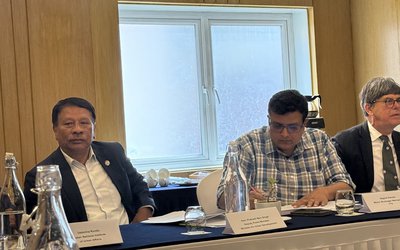Nepal is on a significant journey toward fulfilling the United Nations Sustainable Development Goals (SDGs) by 2030, and libraries are emerging as critical contributors to this effort. Often overlooked, libraries serve as key knowledge hubs that provide access to information while fostering education, digital inclusion, and cultural preservation, all of which are essential for sustainable development.
Libraries as Drivers of Education and Lifelong Learning
Central to the SDG agenda is ensuring inclusive and equitable education for all, a goal represented by SDG 4. Libraries play a crucial role in promoting this by offering equal access to educational resources, particularly in rural and underserved areas of Nepal. By providing free or affordable access to books, research materials, and digital resources, libraries break down educational barriers. This supports the broader SDG framework, which recognizes that access to knowledge and lifelong learning is fundamental for development.
Libraries in Nepal are also at the forefront of fostering digital literacy. Increasingly, they are offering computer literacy programs, which empower rural communities by improving their digital skills and enhancing their job prospects in a technology-driven world. This digital access helps close the information gap, particularly for women and marginalized groups, who may face challenges in adopting new technologies.
Empowering Communities Through Libraries
A significant aspect of sustainable development involves building resilient and empowered communities. Libraries, which have long been spaces for civic engagement and dialogue, play an active role in fostering community well-being. They offer platforms for people to discuss a range of issues, from health and social services to climate change and economic opportunities, all of which are interconnected with various SDGs.
In Nepal, the Nepal Library Association (NLA) has been advocating for libraries to become vehicles for promoting the SDGs. Libraries provide crucial information and resources in areas such as sustainable agriculture (SDG 2), health (SDG 3), and clean energy (SDG 7). They also serve as focal points for environmental education, which is vital for addressing climate action (SDG 13) and protecting life on land (SDG 15).
Digital Inclusion and Bridging the Information Divide
Nepal faces challenges related to the digital divide, especially in remote and mountainous regions where internet access is limited. Libraries, by offering free internet access and digital resources, are essential in bridging this gap. This not only supports SDG 10 (reducing inequalities) but also helps create a more informed and engaged population, which is critical for promoting peaceful and inclusive societies (SDG 16).
The Voluntary National Review 2020 emphasized the importance of partnerships and collaboration in achieving the SDGs. Libraries can play a key role in these efforts by serving as centers for information dissemination and collaborative projects. This aligns with SDG 17, which stresses the importance of global and local partnerships to meet the SDG targets.
Libraries as Advocates for Sustainable Development
Libraries in Nepal are uniquely positioned to advocate for sustainable development. Organizations like the International Federation of Library Associations and Institutions (IFLA) have long championed the role of libraries in supporting the SDG agenda, particularly in their capacity to educate and engage communities. Public libraries, in particular, are seen as vital institutions in driving the achievement of the UN 2030 Agenda.
One of the most significant contributions libraries can make is raising awareness about the SDGs. Through educational campaigns, exhibitions, and targeted programs, libraries can help community members understand the importance of sustainability and how they can contribute. This advocacy is vital for encouraging local actions and fostering grassroots change.
Conclusion: Libraries as Essential Partners for Sustainable Development
As Nepal progresses toward meeting the SDG 2030 agenda, libraries will remain critical in this mission. Beyond being repositories of knowledge, libraries are dynamic institutions that provide access to information, encourage lifelong learning, and empower communities. By aligning their services with the SDGs, libraries in Nepal are demonstrating their crucial role in the country’s path to sustainable development.
To unlock the full potential of libraries in this regard, it is essential that governments, civil society, and international donors recognize libraries as key contributors to sustainable development. With adequate support and resources, libraries can continue to illuminate the way to a sustainable future for all.
Pushpa Raj Subedi is the President of Nepal Library Association















